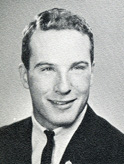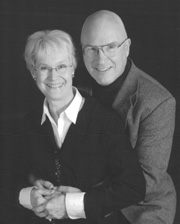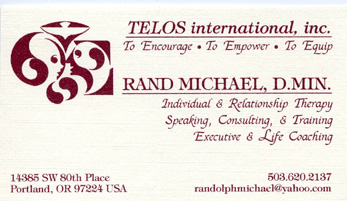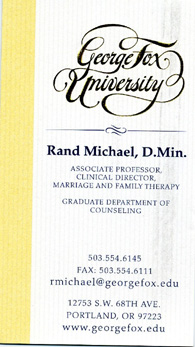 |
|||||||||||||||||||||||||||||||||||||||||||
|
|
|||||||||||||||||||||||||||||||||||||||||||
|
|
|
||||||||||||||||||||||||||||||||||||||||||
|
On October 18, 2008, at its annual banquet held in Eugene, the Oregon Counseling Association honored Rand and Phyllis Michael with its Human Rights Award. Every year at their Fall Conference, the Oregon Counseling Association recognizes individuals from Oregon who have made outstanding contributions to the Association or to the counseling professional at large. In his 1986-87 tenure as national President of the American Counseling Association, Dr. David Capuzzi, a counselor educator at Portland State University, established the Human Rights Award to be presented to members who have demonstrated an exemplary level of professional and personal commitment in the areas of human rights and the advancement of human dignity. Rand Michael, Associate Professor of Marriage and Family Therapy at George Fox University, and Phyllis Michael, Associate Professor of Human Development and Family Studies, have been providing training, consultation, and clinical services internationally since 1987. In 1988, they founded TELOS international, inc., a non-profit, tax-exempt organization whose mission statement is as follows:
To date, the Michaels, along with teams of other TELOS mental health professionals, have served in over two dozen countries from Asia to Africa, Mexico and Latin America to the Balkans and Southeastern Europe, and to the Middle East. While service or training can be offered in a one-time visit, the philosophy is to partner with host groups over a period of time. The goal is to “train the trainer” so there is a growing number of indigenous care givers. Approximately 70-80% of TELOS’s work is with nationals, and the remaining percent being with “ex-pats”—persons who are citizens of one country but are residing in another. An example of the work of the Michaels and TELOS teams is seen in Central Africa where today there are over two dozen “Listening Centres” providing compassion and counseling to people in Burundi and Rwanda. The Michaels and David Nyonzima, a Burundian leader who survived the genocide of the 1990’s, partnered to train a cadre of “listeners.” This two year partnership resulted in Nyonzima’s establishing an organization called THARS (Trauma Healing and Reconciliation Services), whose providers were trained by mental health teams led by Rand and Phyllis Michael. In the two year partnership, TELOS teams “trained the trainers” so that Burundians, Rwandans, and Congolese service providers were equipped to train their fellow nationals in basic counseling and listening skills. Having survived the genocide and actively working in reconciliation efforts, Nyonzima came to recognize the need for true listening in order for healing and reconciliation to take place. When Nyonzima heard of TELOS, he contacted the Michaels to see if there could be a partnering for training in listening skills and processes. “Listening Centres” have been established in the refugee camps of Central Africa which house the tens of thousands of internally displaced persons. By report, the listeners have helped people with everyday concerns--including marital, family and parenting--to the challenges of living in refugee camps, to the continuing processing of the trauma resulting from the genocide, including PTSD. At last count over 3,000 people have been the recipient of the services provided by TELOS trained THARS staff and volunteers. In addition, Nyonzima has been granted permission to take the services of THARS into the government and health care systems. Another example of the work done by the Michaels and their organization is the training of marriage and family therapists in East Asia. Partnering with a graduate of George Fox University’s marriage and family therapy masters degree program and Harmony Counseling Center in Shenyang, China, the Michaels have provided leadership and teaching over the last three and a half years to a group of eighteen Chinese adult learners from around China to provide counseling from what is known as a relational systems perspective, an approach to mental health that fits well with the Chinese emphasis on family and relationships. The faculty, in addition to the Michaels and other mental health professionals from the US, has included professors from George Fox University, Seattle Pacific University, San Diego State University, and Bethel Seminary West. The students in the East Asia project are trained in prevention as well as intervention skills and processes, thus equipping them to provide marriage and family life education experiences as well as therapy. To date, the cohort of eighteen in the therapy concentration as well as others who have been trained exclusively in prevention programs have provided direct service to over 5000 people. A main objective of the East Asia project is to train teachers and supervisors who can carry on the work themselves. A major element of the training project has been the writing of an extensive contextualized curriculum that can be replicated over time by the Chinese themselves. The project is now at the point where selected Chinese students are becoming teaching associates, partnering with TELOS faculty, with the goal of the Chinese eventually being the ones providing the teaching and supervising. As a follow-up to the Kosovor crisis in 1999, the Michaels along with TELOS partnered with Medical Teams International, based in Portland, Oregon, and Mitigation International, a British humanitarian organization, to ascertain the needs of those who provided intense and prolonged care for those traumatized by the Balkan war atrocities. Many of the care givers experienced what is called “secondary stress” and “secondary trauma”—the stress and trauma that can come from providing care for persons who are directly traumatized by war, natural disasters, and other intense experiences. Committed to the philosophy of partnering and being learners in another country, the Michaels first step was to visit key leaders and care givers in order to ascertain current and future needs. The Michaels note that at first these key persons were surprised that they were being asked for their opinion, noting that while they appreciated the efforts of organizations that came to help, the Michaels and their team were the first to inquire about their needs, hopes, and ideas. Based on these “listening meetings,” the Michaels and their team developed and translated a training curriculum that addressed the concerns and hopes articulated by the nationals themselves. One of the things that emerged in the listening meetings was the need for a means to help people look ahead—in addition to processing what they had experienced. Thus, the curriculum included not only skills for effective listening but also for collaborative interpersonal speaking, problem-solving, and planning. Again, the vision included not only equipping people to use these skills and processes in their own lives but to “train the trainer.” During fall of 1999, the Michaels and their team provided trainings throughout Albania, the country which provided refuge for tens of thousands of Kosovor refugees, and in the process equipped a select group to continue the teaching after the Michaels returned to the US. The initiative allowed care givers to process their stress and trauma as well as begin to plan ahead to other possible crises in the future. The work continued in numerous locations throughout Albania and was also carried into Kosovo. Also, from that project, two Albanian team members came to the US as students, earning their undergraduate degrees at Warner Pacific College and their Masters in Marriage and Family therapy at George Fox University. Now fluent in English, Albanian, and mental health, in the summer of 2008 these two graduates served as translators of texts for a college level counseling course offered in Tirana, Albania, with participants coming from Bulgaria, Romania, and Italy as well as from several Albanian cities. The teaching/training team consisted of the Michaels plus two graduates of George Fox University—Alma Gugushi and Steve Stewart— and a local mental health profession—Diane Moore. The course was a follow up to training provided in northwest Bulgaria following the flooding there in 2005 and 2006. The partnership continues as plans are being laid for further training to be provided in either Romania or Bulgaria in 2010. Following the devastating May 2008 earthquake in south central China, you could find the Michaels and team members in Chengdu, China, providing debriefing for care giving teams and in Shenyang, China, training trauma responders. In July of 2008, you could find the Michaels along with George Fox alum Sharon Casurella Hicks and her husband Ron in India, training student nurses who come from abject poverty and who will serve residents of the hundreds of poor villages throughout central India. The focus of the nurses training: listening, of course! A recent focus in brain research has been what is called “interpersonal neurobiology.” The results are showing the significant role listening plays in emotional and relational healing. The work of the Michaels, TELOS, and its teams can be understood as “simply listening” and being trained to “simply listen” and that is true but there is much more to it. The importance of the service and training is being verified by stories of healing and the result of brain research. |



